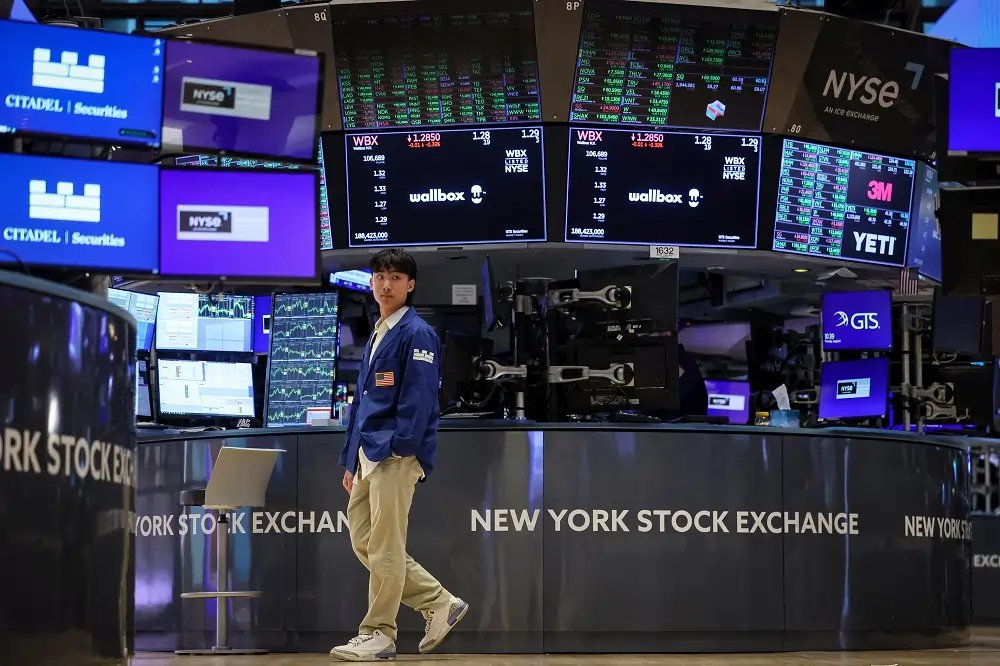Global stock index rises with dollar, yields as data calms nerves


By Sinéad Carew and Harry Robertson
NEW YORK/LONDON (Reuters) -A closely followed global equities index jumped more than 1% on Thursday after lower-than-expected U.S. unemployment claims calmed recession fears and Treasury yields rose alongside the U.S. dollar.
Oil futures registered their third straight day of gains, with growing supply risks in the Middle East offsetting any demand concerns that at the start of the week had pushed prices to their lowest levels since early 2024.
On the data side, the U.S. Labor Department said initial claims for state unemployment benefits fell 17,000 to a seasonally adjusted 233,000 for the week ended Aug. 3, marking the largest drop in about 11 months and falling short of economist expectations for 240,000.
“The reason for the positive attitude today is jobless claims that were lower than expected. This made people feel better, that the jobs market is not falling off a cliff,” said Irene Tunkel, chief U.S. equity strategist at BCA Research.
But, along with the fact that August and September are typically weaker months for stocks performance, Tunkel cited many reasons investors may need to prepare for more volatility.
“There’s a tug of war between the soft landing camp and the hard landing camp,” she said.
We’ve U.S. elections, heightened geopolitical tensions in the Middle East and poor seasonality as well as the incoming economic data and the Fed’s reaction to it. We’re in a period of heightened uncertainty and the market hates uncertainty.”
Thursday’s claims data was more closely monitored than usual after a weaker-than-expected July jobs report last Friday helped spark Monday’s financial market rout that spanned the globe.
The sell-off was partly caused by investors being forced to unwind carry trades, where they borrow cheaply in Japan to buy dollars and other currencies to invest in higher yielding assets. The unwind helped trigger a 12% plunge in Japanese stocks on Monday and the S&P 500 index followed with a 3% drop.
But on Thursday, Wall Street was in a bullish mood. At 02:49 p.m. the Dow Jones Industrial Average rose 668.65 points, or 1.73%, to 39,432.27, the S&P 500 gained 117.62 points, or 2.26%, to 5,317.12 and the Nasdaq Composite gained 450.16 points, or 2.78%, to 16,646.01.
MSCI’s gauge of stocks across the globe rose 11.16 points, or 1.45%, to 781.86. Prior to Thursday’s session, the global index had registered 16 daily losses or gains of 1% or more while the S&P 500 has registered 32 such moves so far this year.
Earlier, Europe’s STOXX 600 index closed up 0.08%.
STRONGER DOLLAR
In the currency market, the dollar index, which measures the greenback against a basket of currencies including the yen and the euro, gained 0.11% to 103.22.
Against the Japanese yen, the dollar strengthened 0.4% to 147.27. The euro was down 0.05% at $1.0916.
Earlier on Thursday, yields on U.S. Treasuries rose after the unemployment claims data fuelled hopes that the U.S. economy would not face an imminent recession. Then yields extended gains after a weak auction of 30-year Treasuries.
The yield on benchmark U.S. 10-year notes rose 2.4 basis points to 3.992%, from 3.967% late on Wednesday.
The 30-year bond yield was up 1.8 basis points at 4.2793% compared with 4.261% late on Wednesday.
The 2-year note yield, which typically moves in step with interest rate expectations, rose 4.1 basis points to 4.0421%, from 4.001% late on Wednesday.
In energy markets, U.S. crude settled up 1.28%, or 96 cents at $76.19 a barrel and Brent finished at $79.16 per barrel, up 1.06% on the day.
In precious metals, spot gold added 1.78% to $2,423.89 an ounce. U.S. gold futures gained 1.25% to $2,420.50 an ounce.
(Reporting by Sinéad Carew, Noel Randewich, Karen Brettell and Harry RobertsonEditing Gareth Jones, Kirsten Donovan, Sharon Singleton, Paul Simao and Sandra Maler)
A recession is a significant decline in economic activity across the economy that lasts for an extended period, typically visible in GDP, income, employment, manufacturing, and retail sales.
The S&P 500 is a stock market index that measures the stock performance of 500 large companies listed on stock exchanges in the United States, serving as a benchmark for the overall market.
Explore more articles in the Top Stories category











